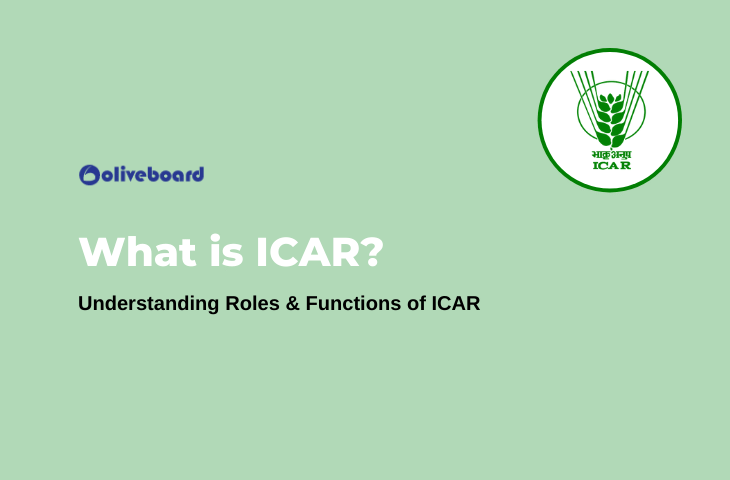The Indian Council of Agricultural Research (ICAR) is an autonomous organization that works in Agriculture, Animal Science, and fisheries in India. The Department of Agricultural Research and Education (DARE), Ministry of Agriculture and Farmers Welfare, Government of India runs this organization. Read further to know more about the council, like roles, functions of ICAR, initiatives, vision, etc.
What Is ICAR?
ICAR is the apex body for regulating, supervising, and leading research & education in agriculture, including horticulture, animal sciences, and fisheries in the entire country.
- It was formerly known as the Imperial Council of Agricultural Research.
- It was founded on 16 July 1929 as a registered society under the Societies Registration Act of 1860.
- Its main headquarters is in Krishi Bhavan, New Delhi.
- Its president is the Minister of Agriculture. At present, Shri Narendra Singh Tomar is the President of ICAR.
- It is one of the largest national agricultural systems in the world, as it runs 102 ICAR institutes and 71 ICAR agricultural universities.
- Its members comprise the minister of Agriculture, Animal Husbandly & fisheries, and senior officers of the various state governments and representatives of the parliament. Also, agro-industries, scientific organizations, and farmers are part of ICAR.
- Its Governing Body is the chief executive and decision-making authority. The Director-General heads this Governing Body, which comprises eminent agricultural scientists, legislators, educationists, and representatives of farmers. The Standing Finance Committee, Regional Committees, Accreditation Board, and several scientific panels assist the Governing Body.
- The Director-General of the ICAR serves as the principal advisor of the Government of India in all matters related to research & education in agriculture and allied fields.
- It celebrated 93rd Foundation Day on the 16th of July 2021.
- Its president, the Minister of Agriculture, launched a digital Platform, the KISAN Sarathi App, during the virtual celebration of its 93rd foundation day.
Roles Of ICAR
- The ICAR has played an important role in leading the Green Revolution and subsequent progress in agriculture in India with the help of research and technology development.
- It has helped the country in enhancing the production (from 1950-51 to 2017-18) of
- food grains by 5.6 times
- fish by 16.8 times
- horticultural crops by 10.5 times
- milk by 10.4 times
- eggs by 52.9 times
- It has performed a significant role in encouraging quality in higher education in agriculture.
- Functions of ICAR include bringing innovation to areas of science & technology development and enabled its scientists to get international acknowledgement in their fields.
Functions Of ICAR
The ICAR that works under the Department of Agricultural Research and Education, Ministry of Agriculture, India, is one of the important organizations at both the national and international levels. It plays a vital role in the fields of education, science & technology. Some of the significant functions of ICAR include:
- To plan, start, support, promote and coordinate education, research, and its utilization in agriculture, animal science, agroforestry, fisheries, and allied sciences.
- To act as the clearing house for research & general information related to agriculture, fishery, animal husbandry, home science, agroforestry, allied sciences by its publications & information system and establishing & promoting technology programs.
- To offer, undertake, and promote consultancy services in education, training, research, and distribution of information in agriculture, fisheries, animal science, home science, agroforestry, and other allied sciences.
- To look into the problems related to broader areas of rural development in agriculture, including post-harvest technology, by developing some cooperative programs with the help of other organizations like the Indian council of social Science Research, Bhabha Atomic Research Centre, state Agricultural Universities, Council of Scientific and Industrial Research, etc.
- To do many other important tasks, those are necessary to attain the objectives of the society.
Initiatives Taken By ICAR
- Farmers Innovation Fund: ICAR has planned a system that will scientifically authenticate, scale up, and support the innovations of reformist farmers. It will set a centre for innovation in New Delhi to validate their innovations scientifically and allow them to pursue research work. The system will link farmers and farming with science and encourage them to continue their innovations.
- Nano fertilizers and Nano pesticides: ICAR encourages organic farming and helps produce nano fertilizers and nano pesticides to reduce the side effects of using pesticides and fertilizers.
- Technology in Agriculture: ICAR emphasizes that agriculture is a science, and scientific techniques boost agriculture. It has formed a tie between 105 startups and farmers to promote technology in the farming sector.
- Farmers’ Science Congress: ICAR inaugurated the Congress in 2020 with a theme of “Science & Technology: Rural Development” to highlight the significance of farmer’s innovations and their scientific validity.
- Organic Farming: ICAR has formed 45 different organic farming models fit for different agro-climatic regions. It has also approved 51 integrated farming systems that will help in increasing farm income.
- Attracting and Retaining Youth in Agriculture (Arya): ICAR has started a youth program, named Arya, to attract youth towards agriculture and improve rural bio-economy.
Visions Of ICAR
ICAR and the National Agricultural Research & Education System have worked towards implementing science innovations for the welfare of society. The Council works for the benefit of the farmers, industries, entrepreneurs, and even consumers. The main visions of the ICAR are:
- ICAR took the first systematic step towards envisioning the challenges and opportunities in the last year of the 20th century and developed the ‘ICAR Vision 2020.
- After five years, it made the next effort by drawing out the ‘Perspective Plan’ and the ‘ICAR Vision 2030.
- It released the ‘ICAR Vision 2050’ in 2015 to provide the strategic framework for innovation-led and sustainable (organic) agricultural growth.
The Indian Council of Agricultural Research (ICAR) is an apex education and research organization. It features a high rank amongst top international agricultural research institutions. It works progressively in agricultural research, education, and expansion activities to enhance and diversify Indian agriculture. To keep pace with the dynamic environment and innovations in science, it keeps updating its visions, strategies, and Functions of ICAR for the betterment of farmers and society.
ICAR AO Preparation and Complete Course
Ease your Preparation with ICAR AO 2021 Complete Course
To help you ease your preparation for the ICAR AO 2021 exam, we have come up with an all-inclusive cracker course that will cater to all the components of the exam. We have made sure to cover the study material for your prep for Tier-1 and Tier-2 (Paper-1, 2, 3 & 4) exams.
Course Highlights
- Video Lessons + Study Notes + Current Affairs for Tier-2 Papers
- Answer Writing Practice Sessions Tier-2 Papers
- 5 Full-Length Mock Tests for Tier-1
- 8 Descriptive Tests for Tier-2 Papers with expert evaluation
ICAR FAQs
ICAR was founded on 16 July 1929 as a registered society under the Societies Registration Act of 1860.
The Minister of Agriculture, Shri Narendra Singh Tomar, is the present president of ICAR.
Also, Check:

The most comprehensive online preparation portal for MBA, Banking and Government exams. Explore a range of mock tests and study material at www.oliveboard.in

